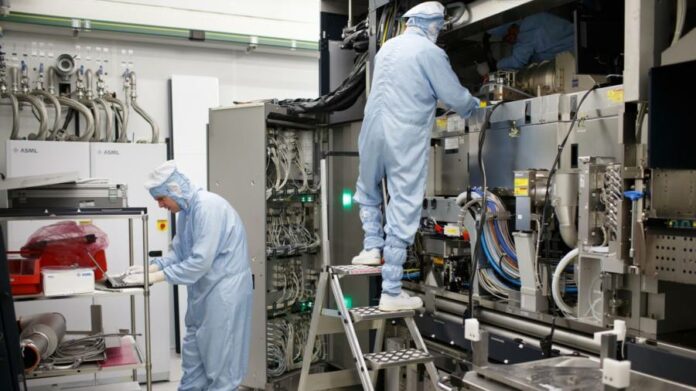Dutch chip toolmaker ASML has revealed an employee in China recently stole information about its technology which may have resulted in export controls being violated, in an incident that underscores the company’s importance in the global battle to produce advanced semiconductors.
ASML, the international leader in the production of so-called lithography machines that use light to etch semiconductors, said in its annual report on Wednesday that it had been “subject to misappropriation of data relating to proprietary technology by a (now) former employee in China”.
“Although we do not believe that the misappropriation is material to our business, certain export control regulations may have been violated,” it added, given that recent international export controls relate to the supply of information as well as physical tools.
The company said it had reported the incident to the Dutch and US authorities.
ASML, the largest tech company in Europe with a market capitalisation of €248bn, holds a unique and crucial position in the chip supply chain as the only company able to make highly sophisticated extreme ultraviolet lithography (EUV) machines. It has also found itself entangled in the trade war between Washington and Beijing since 2019 when a shipment of one of its EUV machines to China was blocked.
The issue of IP theft and tech transfer is not new to ASML. Its last annual report flagged concerns that a Chinese company specialising in products to improve chip yields had potentially infringed its intellectual property, though the incident in question took place in 2015.
After a concerted lobbying effort by the US, the Dutch and Japanese governments agreed last month to further tighten their restrictions on certain tools and technologies that could support the expansion of China’s advanced chip sector.
Peter Wennink, ASML’s chief executive, said in a statement accompanying the report that he understood that these new measures “cover advanced lithography tools as well as other types of equipment”.
“On a geopolitical level, the bifurcation of socio-economic blocks — with the associated export and import controls — is threatening the development of the global village that contributed so much to a lot of the innovation we have seen in recent years,” he said. “If countries or trade blocks withdraw into their own territories, then innovation will be less effective and more expensive.”
He noted however that he did not expect these new measures to have a material impact on ASML’s business for 2023.
Last month, the toolmaker reported a record order backlog of more than €40bn and forecast that sales would increase by 25 per cent this year. Wennink said that any sales lost through export controls could be recouped by selling to customers in its growing backlog.
Given ASML’s effective monopoly on the advanced machines required to make advanced chips, some analysts have questioned whether intensifying restrictions could turbocharge China’s efforts to develop its own domestic toolmaking industry.
In December of last year, Huawei reportedly filed a patent application for one of the most advanced facets of an EUV machine.






